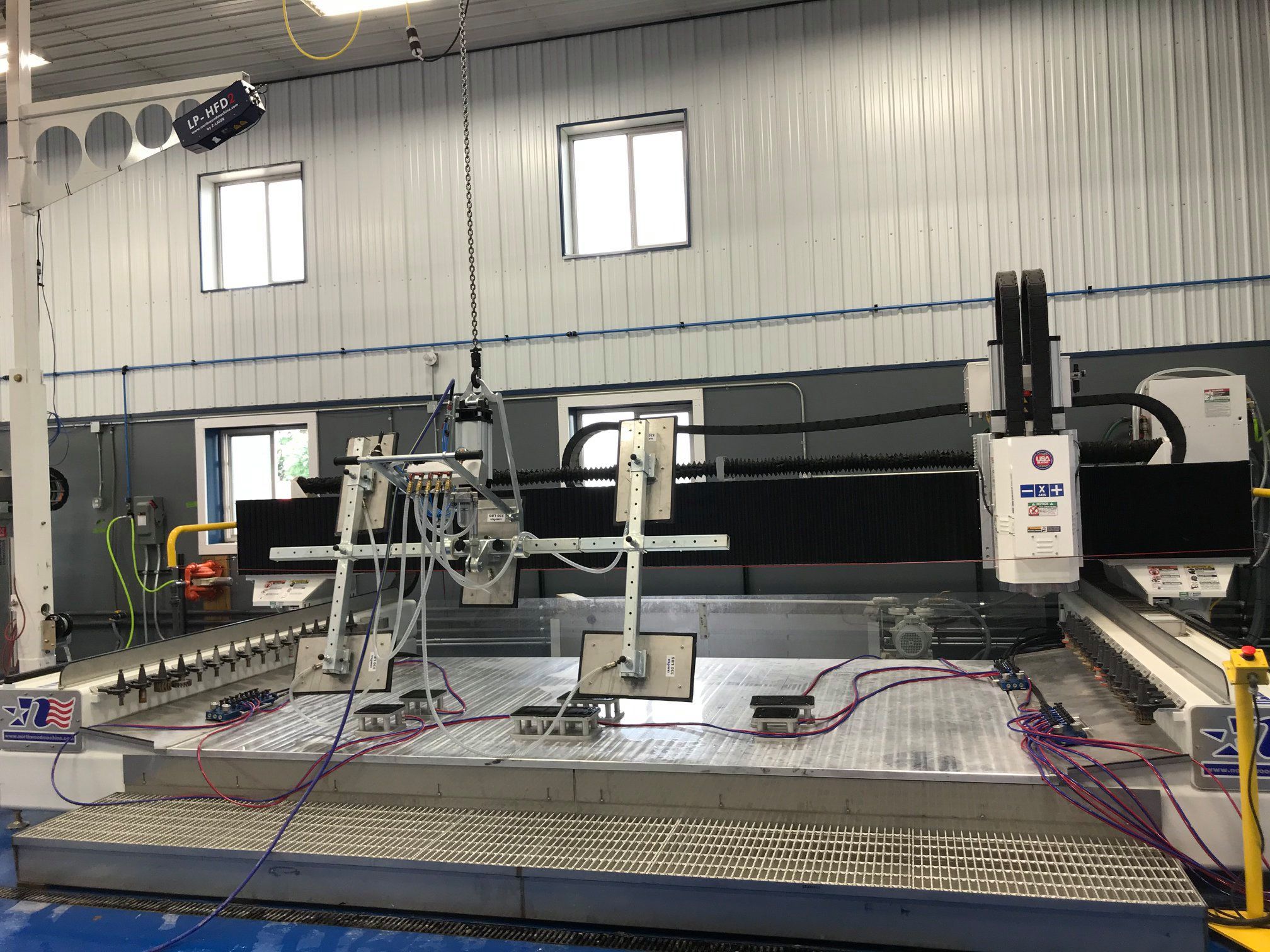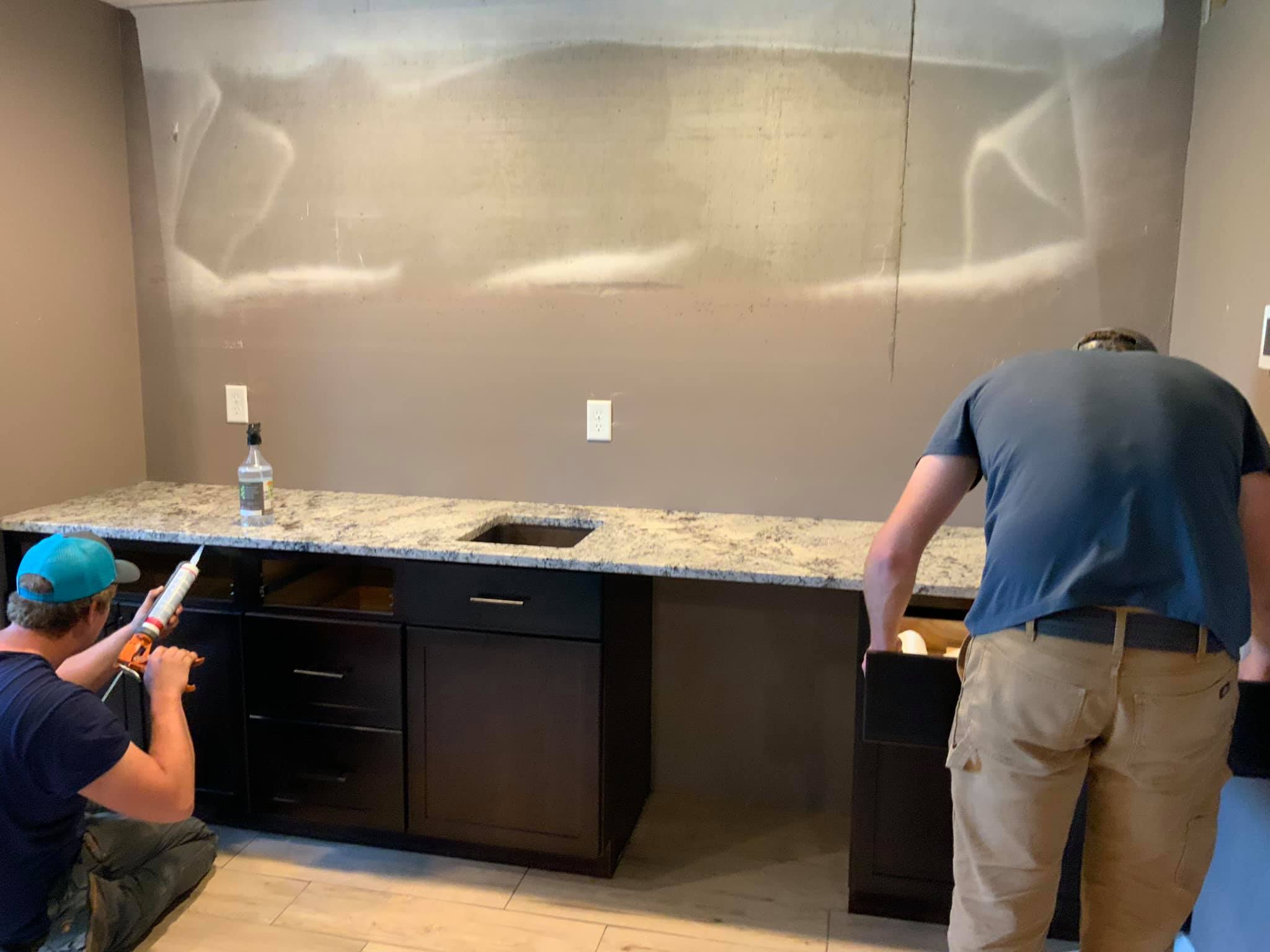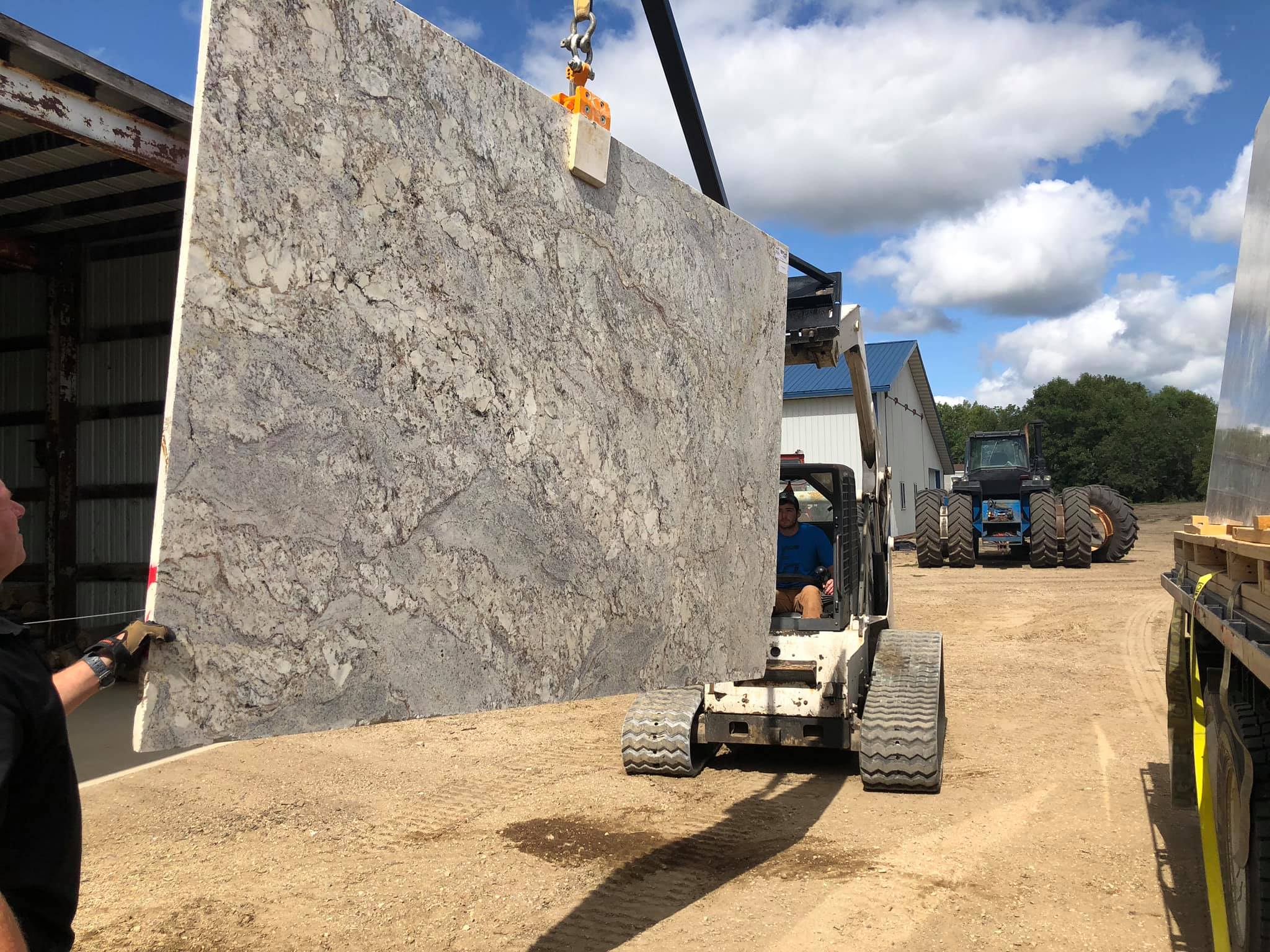Fabricator Focus
Prairie Stone Countertops New Effington, S.D.
"One of our goals is to have happy people working here."
Above: Photo courtesy Prairie Stone. Previous page: Photo by Mikkel Pates / courtesy AGWEEK

By K. Schipper
NEW EFFINGTON, S.D. – The American Farmer: hard working, not afraid of big challenges -- and, if things aren’t going well -- and a wait-til-next-year optimism that would put a sports-team’s owner to shame.
In recent years, it’s also not uncommon for farmers to take on side gigs to keep the income flowing during down times. But a stone shop? On a farm in the far northeast corner of South Dakota? Even Jeff Hoeft’s wife was more than a little skeptical, and that was before COVID-19 appeared on the horizon.
However, Prairie Stone LLC began operating this spring, and while it’s only just beginning, it’s an operation that Hoeft believes can employ a dozen people within five years.
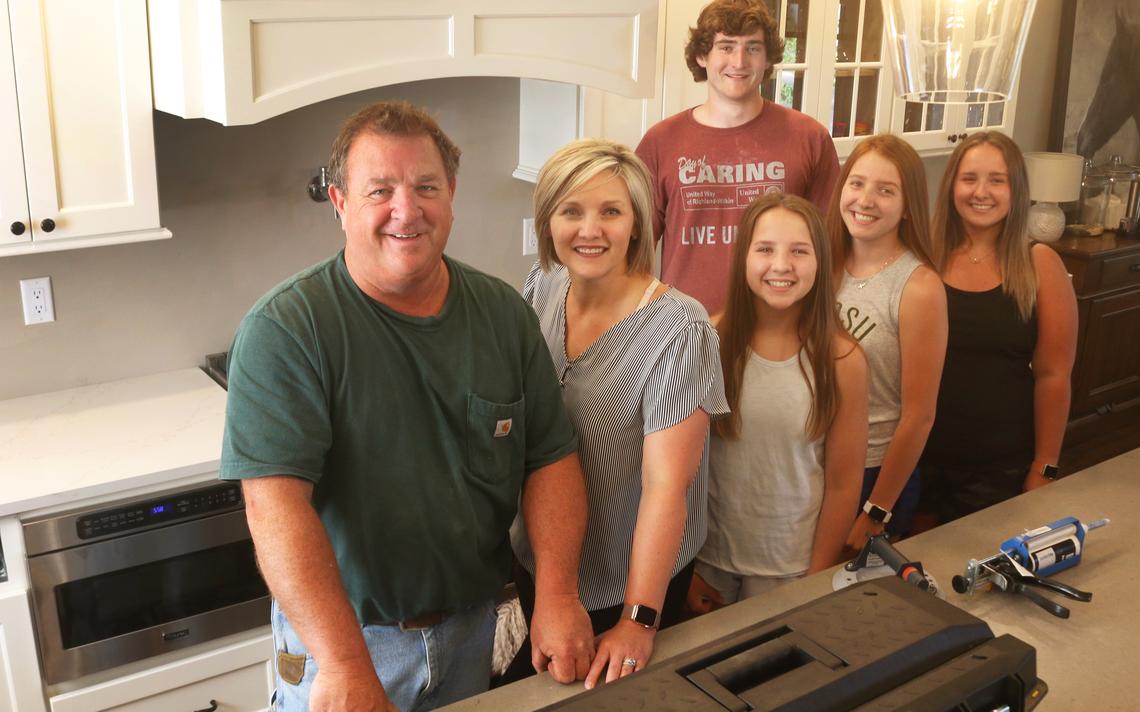
Jeff and Jennifer Hoeft, altong with daughters -- twins, Gracie and Claire, both 19, and Gillian, 12 -- along with farm/fabrication worker Caleb Bellig. (Photo by Mikkel Pates / courtesy AGWEEK)
CUSTOMER'S REVENGE?
That Prairie Stone even came into existence is a case of Hoeft taking his lemons and making lemonade. And, in this case, the lemons were served up by other stone shops within his region. If there’s one thing Hoeft knows besides farming, it’s construction. As he explains it, over the past decade, he and wife Jennifer started flipping houses in their off-season; they kept busy themselves and found a way to keep farmhands occupied during the winter. Perhaps surprisingly, Hoeft is a commuter. While he farms 1,200 acres of corn and soybeans in South Dakota, he and his family live in the next county north – in Wahpeton, in the extreme southeast corner of North Dakota. “Back in 2017, we had bought the house that was next to us and flipped it,” he says. “We finished up in May and then our own house burned. It was the spring, and we couldn’t find another home to move into, so we decided to rebuild.” Much of that work had to wait until after the busy farming season. And, until then, the Hoefts had never considered stone countertops. “At that point I had no knowledge of anything to do with stone countertops,” Jeff Hoeft admits. “I always thought it was something we probably couldn’t afford, so we’d never gone down that road before or even tried.” This time, however, Jennifer Hoeft traveled to Fargo, N.D., visited a shop there, and figured stone was in the family’s future. Unfortunately, when Jeff Hoeft called later in the winter to get the order moving, he didn’t like the answer he got. “He was like, ‘Well, we’re busy with other projects up here right now, and I’m not sure when we can get to yours,’” Hoeft says. “He was supposed to be doing our whole house and we were trying to get moved back in.” More than a little angered, Hoeft admits to calling 20 different shops within a 300-mile radius of Wahpeton to be told it would be six-to-eight weeks. And, when he settled on a company and the countertops arrived, he described the head of the installation crew as, “a total jerk.” When he asked why it had taken so long, the response he got was, “It just does; it’s a very specialized industry.” However, it also got Hoeft thinking, and he started researching stone fabrication and installation. One of the things he did was talk to those other stone shops, to ask if they’d be threatened by the appearance of another fabricator in the market. Their universal response: They’re so busy it would be great to have another shop in the area. “I didn’t get any negative feedback from anybody when I first started looking at this,” Hoeft says. “I still haven’t.” Well, almost. The one person who didn’t get onboard with the idea right out of the gate was Jennifer Hoeft. “For the first year she didn’t want me talking about this in public because it was so crazy,” says her husband. “She told me I was nuts. She wondered why I would want to do this after farming for 30 years. But farming has gotten so competitive and the margins are so tight, we needed to do something else. “There were definitely some tough times,” he adds.
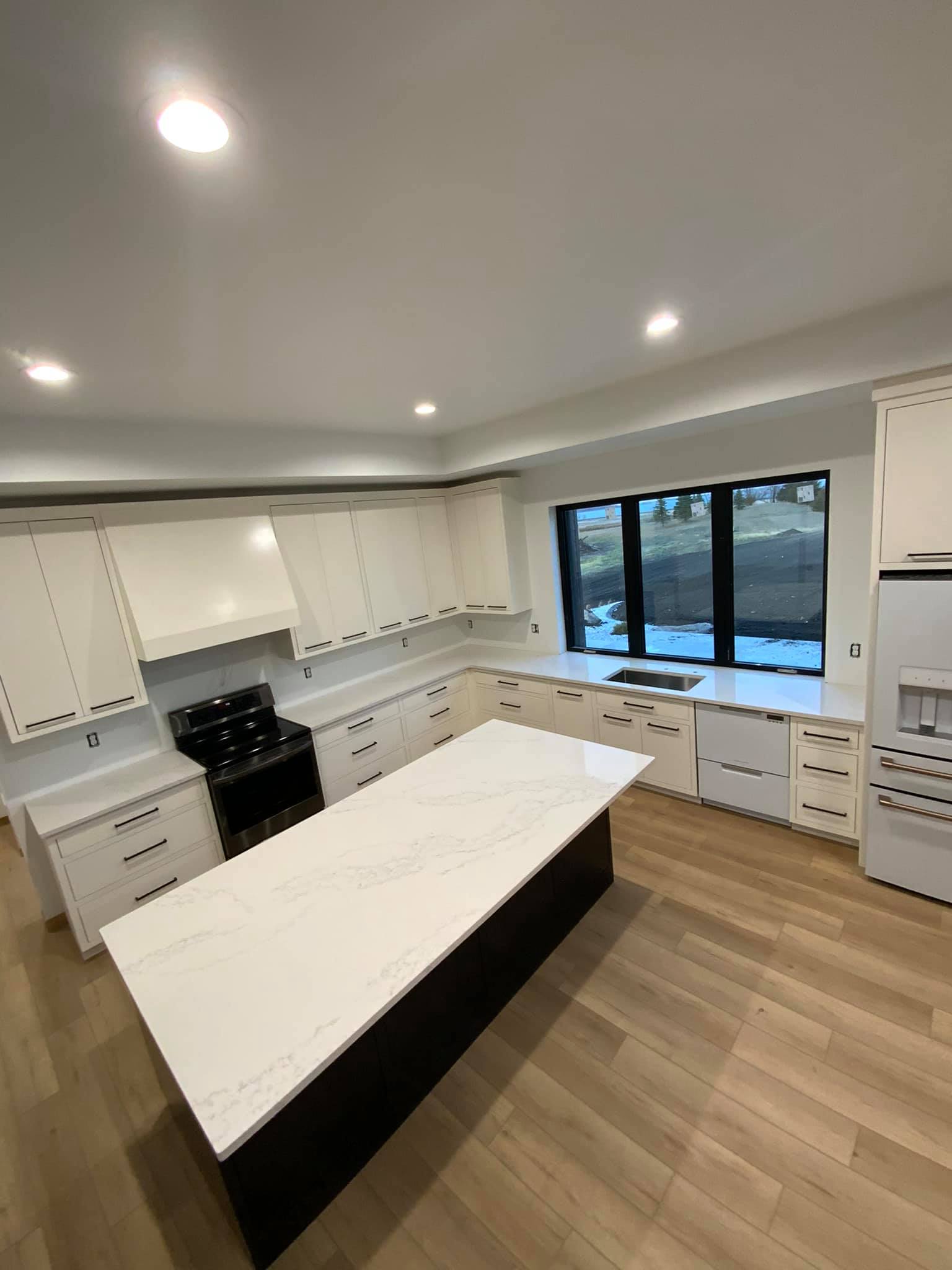
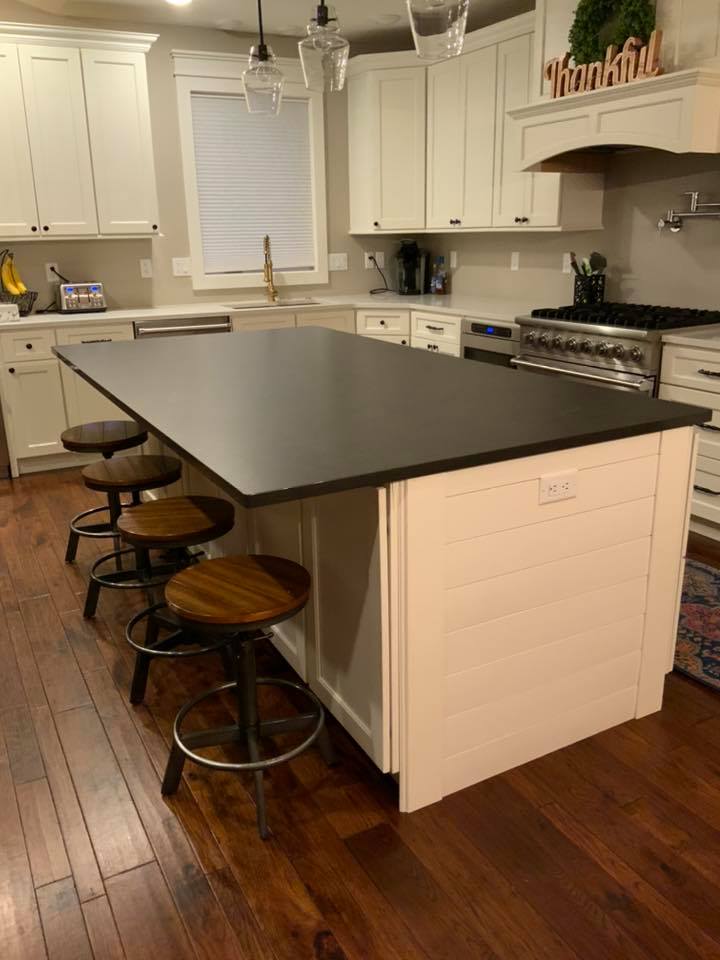
Getting the technicians here was a huge issue because no one could travel."
Jeff Hoeft
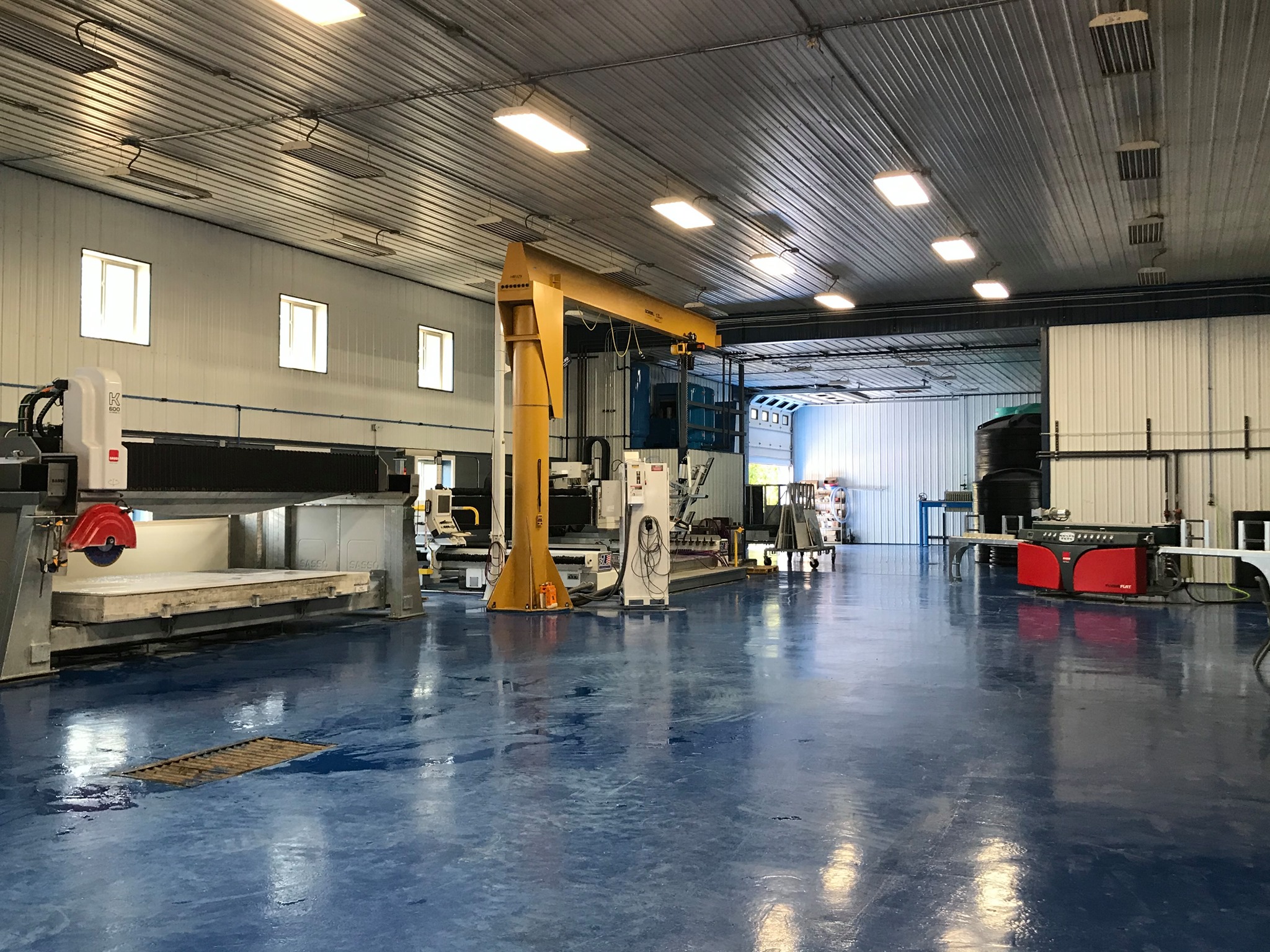
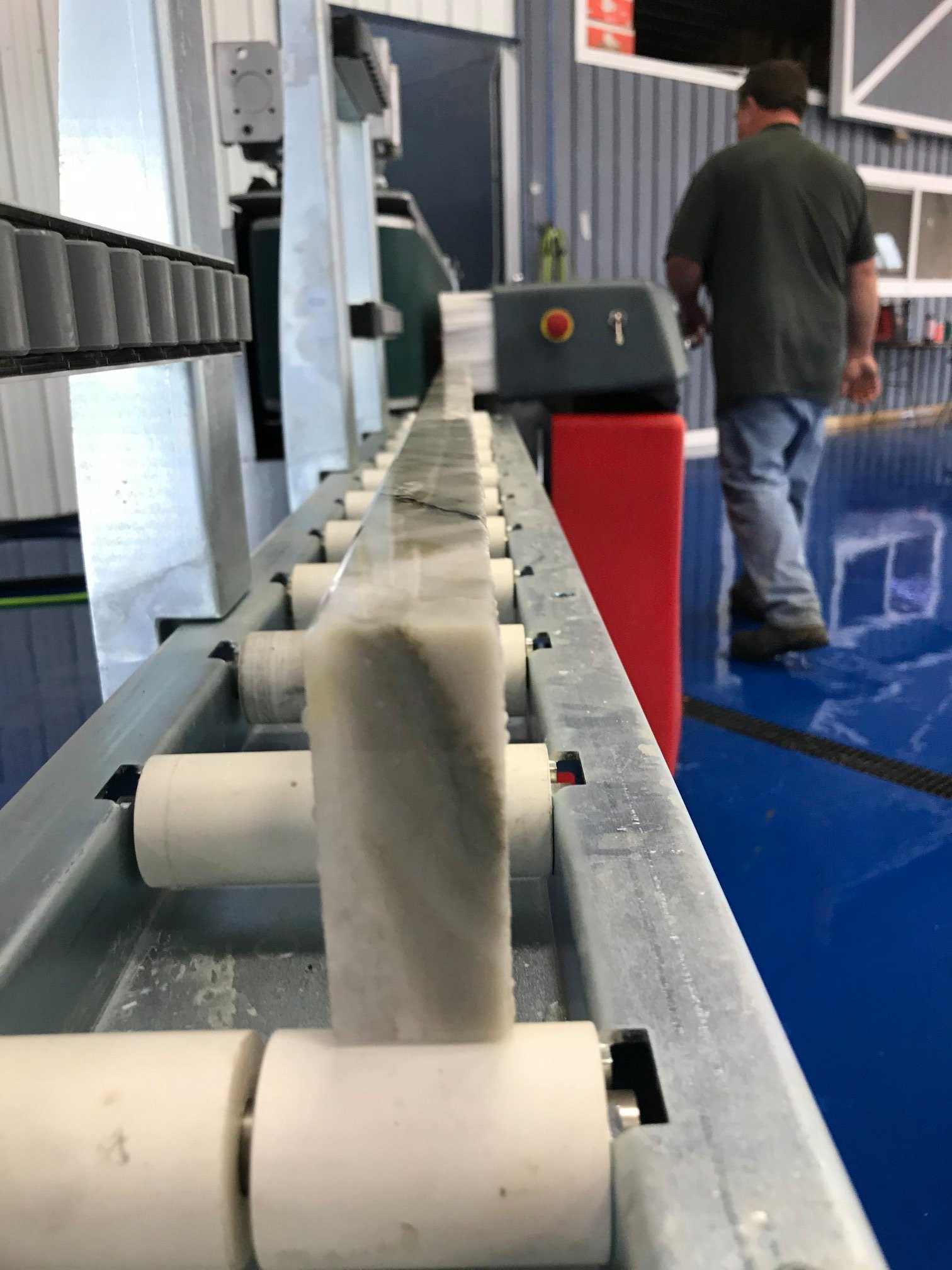
STURDY FOUNDATION
Hoeft took his time doing his research and making his plans. He began by considering buying used machines, but says he heard too many horror stories about it to seriously consider that route. Then, at some point, he encountered Mark Lauzon on an industry website. Lauzon is a fabricator and consultant to the stone industry who’s also the sales manager for Sasso USA. “He started talking to me and encouraging me,” says Hoeft. “In the end, I didn’t want our competition to be able to say that we didn’t have this or that. We have things they don’t have, and I think that’s huge.” Hoeft was also fortunate in another way. Wahpeton is the home of North Dakota State College of Science, and he’s been a decades-long participant in its adult farm-management program. That background convinced him he would have to have a concrete business plan. For help on that, he turned to the adult farm-management instructor, Kara Wulfekuhle. “She and I started formulating things, coming up with scenarios on cash flow and everything else,” Hoeft says. “It probably took two to two-and-a-half years to get everything done and get the financing.” Utilizing funds from the Small Business Administration and the Bank of North Dakota, Hoeft was able to assemble what he calls “a dream shop.” And, unlike many others, he had enough space in which to build it out. The heart of the operation is an 80’ X 80’ building he constructed in 2011. Last winter, it was rebuilt, with attention to the floor and the installation of drains. At Lauzon’s suggestion, the floor is also epoxied. Although a traditional choice might have been white, Hoeft went with blue. “The shop feels warm and inviting,” he says. “The guys like it and they like the compliments about it. And one of our goals is to have happy people working here, because the shops I visited, they just weren’t there.” The shop contains the company’s Northwood Machine Manufacturing Co.’s CNC, a Sasso five-axis saw and Flying Flat line polisher, and a jib crane for moving slabs. Getting the shop set up and everyone trained was a true challenge, partly due to Prairie Stone’s location, and partly because it happened early this spring, just as COVID-19 grabbed the country and shut it down. At least, Hoeft says, as a farmer he’s used to handling big equipment. “Unloading it and getting it moved into the shop wasn’t an issue,” he says. “Getting the technicians here was a huge issue because no one could travel, and if they could travel where would they stay and where would they eat? We waited it out a little bit because we didn’t want to be the person that brought COVID to the area.” The business also utilizes another 30’ X 40’ building nearby, and a 10,000 ft² unit for slab storage. Perhaps the thing of which Hoeft is most-proud, however, the level of computerization in the shop. “I was a person that couldn’t send an email two years ago,” he says. “I had nothing to do with computers. This has been a baptism-by-fire into the digital age for me.”
“We’re taking it month-by-month here because of how everything has changed.”
Jeff Hoeft
CHEAPER, FASTER, BETTER
Fortunately, he’s been aided in that by younger employees and his twin 19-year-old daughters, who are first-year college students. And, the digital universe is quite important to the business, which relies on Slabsmith™ and Prairie Stone’s online presence – website and Facebook page – to help with marketing. Prairie Stone’s rural location isn’t a problem. Hoeft explains that his slabs come from a Minneapolis supplier once or twice a week. The shop is also within shouting distance of Interstate 29, (with a billboard out front) and the operation does have an approximately 30’ X 30’ display area set up. “The billboard has been really good,” Hoeft says. “Facebook has probably been the best. It’s hard for us to get people to the website, and the website has visualizers and everything on there. However, once they do go to the website, then they can come in and make an informed decision. They know, within one or two stones, what they want.” “Stones” is also something of a misnomer, because Hoeft estimates that 80% of his work has been in quartz, with the remainder almost exclusively granite. The company also recently scheduled its first porcelain-slab project. “It’s pretty new to the area,” he says of porcelain. “Nobody brought it in, and nobody offered it.” The company’s work so far has almost exclusively been residential. Surprisingly, for a guy who flipped houses, Hoeft has seen more of Prairie Stone’s work go into new homes, rather than remodels – on about a two-to-one ratio. “If we do one or two jobs for a developer, it seems like we’re taking over the account from whoever else was doing it before,” he says. “Of course, there are some people who want something crafted by hand, but we can do it cheaper, faster and better.” Northwood and Sasso each had their techs spend three weeks at Prairie Stone, but Hoeft admits that, in some areas, he’s still feeling his way. For instance, when the time comes to template a job, both Hoeft and his righthand man, Caleb Bellig, make the tripJeff . “Part of that has been so we can meet the customer again and talk to them,” Hoeft says. “It’s nice to have a second hand there checking everything, and we’re building both our competencies working together. And we all come to do the install.” That “all” includes a third person in the shop. Just as he and Bellig have learned as they’ve gone along, Hoeft is keen to train others. And, while he’s had inquiries from employees of some of his competitors, as with farming, he prefers to start from scratch. “I found anytime I hired a farm kid for the farming side, I had to break them of all those bad habits,” he says. “Or, they had habits that were different from what we wanted. We don’t want people to bring that old baggage along.” So far, it’s an approach that seems to be working. The shop averages three kitchens a week, and if it has the materials, Prairie Stone can turn a job around in a week. That has been a draw for customers, although as Hoeft’s story has spread, he says some of it is just people who call because he’s a farmer “I never thought that would be much of a drawing card,” he says. “But it seems everyone that has called has some attachment to a farm and they want to talk about it and are excited to be part of something like this.” Even Jennifer Hoeft has gotten onboard, and while Jeff Hoeft admits his pre-COVID five-year goal of having 13 or 14 employees may be out of reach, he remains optimistic. “We’re taking it month-by-month here because of how everything has changed, but I would like to think in five years we’ll be up to 10 or 12 employees,” he concludes. “I think we spent enough time researching and learning things before we got to this point that everything seems to be clicking now.”
